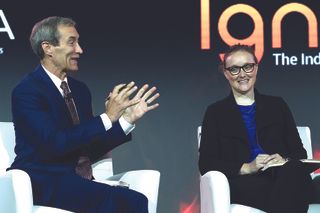Hot-Button Issues Ignite Indie Show
CHICAGO — Broadband, OTT, the fight against onerous and outdated regulation and a pep talk from an unlikely source — a programmer — were all a part of the 2019 Independent Show, the yearly gathering of smaller, independent operators here.

This year’s theme was “Ignite” and the return to Chicago appeared to be a charm — the show was first launched 14 years ago in the city under the theme “Winds of Change” — with hundreds of operators, programmers, equipment vendors and their families making the trip to the Sheraton Grand Chicago hotel. The 2020 show will be held in San Antonio, Texas, July 26-29.
Viacom CEO Bob Bakish became the first major programming CEO to headline a keynote session at the show, and although he noted the sometimes contentious relationship his company has had with small cable in the past, came to mend fences with operators.
Fixing ‘Frayed’ Relations
Bakish admitted that Viacom’s past dealings with small cable operators have been “frayed:” Cable One and Suddenlink dropped the networks in 2014. (Only Suddenlink eventually renewed.) Since Bakish came on board in 2016 and focused the programmer on its six core brands, though, Viacom has worked hard to repair that relationship.
“[W]e stepped back, evaluated the situation to figure out how we could work with distributors in a more partnerly way,” Bakish said, which he determined would be to expand the scope of the distribution relationship, including licensing linear feeds and VOD content and exploring deeper relationships on the advanced advertising front.
“Since we’ve done that, we haven’t gone dark with anyone, we’ve renewed or extended the vast majority of our traditional sub base, we’ve actually increased our distribution and we’ve gotten access to plant for advanced advertising,” he added.
Multichannel Newsletter
The smarter way to stay on top of the multichannel video marketplace. Sign up below.
Bakish expects that relationship to evolve to its new acquisition, with Pluto TV becoming a successful complement to cable broadband service.
“The reality is, all of you have footprints and markets all around the country in all different-sized markets,” Bakish said. “There is great power in that, because you have those local consumer connections. I don’t want to go build those. I would rather work with the people that have them and figure out how, working together, we can grow our businesses.”
Regulation, as always, was a big topic at the show, with former Bush White House press secretary Ari Fleischer urging operators to continue to pressure regulators on issues important to their businesses.
“If you’re not involved, you’re going to lose,” Fleischer said in a Q&A with ACA Connects president and CEO Matt Polka, adding that particularly with complex issues like net neutrality, few members in the House and Senate fully understand the issues weighing on the industry. “The only way they will believe in you is if they see you, they hear you and they feel you. Activism is at the heart of what you have to do.”
Former NCTC chairman and retired MCTV chief Bob Gessner kicked off the conference with a CEO panel featuring top executives in the small cable space — including his daughter, MCTV president Katherine Gessner, who pointed out just how powerful offering a compelling high-speed service can be.
Katherine Gessner said MCTV began overbuilding its network with fiber-to-the-home in 2014 or 2015 and last year began acquiring a few small properties near its traditional service territory. Upgrading those systems has resulted in strong broadband growth, she said.
“We shut off the analog plant in the first system in November and went from 0% internet penetration to about 20% in about seven months,” Katherine Gessner said. “It really opened our eyes to the need for rural broadband.”
OTT, SVOD in Spotlight
OTT and SVOD products also garnered some attention from small operators. In a panel session titled “Kindling and Sparks … Getting Your OTT & SVOD Strategies Blazing,” Vyve Broadband senior vice president of marketing and customer service Diane Quennoz said the days when every pay TV provider’s video packages were the same are over.
“The challenge is picking the right horse,” Quennoz said. “TV can’t be the same way it was three, five or even 10 years ago. Viewing habits change. The challenge is we have so many different carriers.”
Cincinnati Bell director, programming and content Jonathan Bond pointed out the difficulty that smaller operators have when dealing with mega-companies like Netflix.
“Netflix called us ‘cute’ when we had 300,000 video subscribers and 170,000 broadband subscribers,” Bond said. He was not optimistic that the SVOD pioneer’s recent subscriber losses — it shed 130,000 domestic customers in Q2, its first period of domestic subscriber losses — would make it more receptive to smaller operators.
“Probably not,” Bond said. “It would probably take multiple quarters [of declines].”
